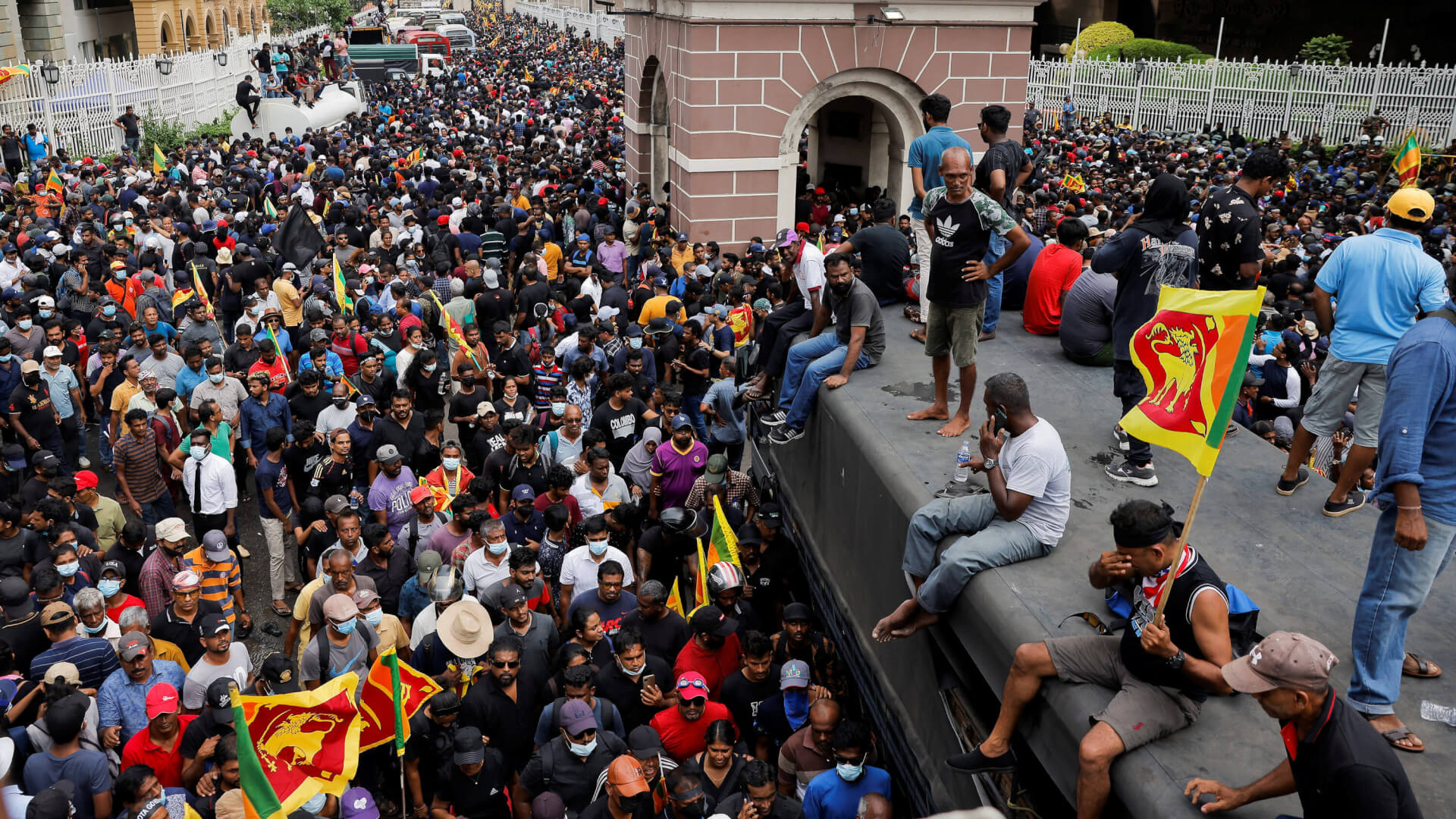Following months of protests over his economic mismanagement, Sri Lankan President Gotabaya Rajapaksa on Saturday tendered his resignation as protesters stormed his residence in Colombo. Soon after, newly-appointed Prime Minister (PM) Ranil Wickremesinghe also stepped-down on the basis of recommendations from party leaders to make way for an all-party government.
On Saturday, the Speaker Mahinda Yapa Abeywardena confirmed that the president will resign on July 13 “to ensure a peaceful transition of power.” Wickremesinghe’s office confirmed this in a statement today.
To ensure the continuation of the Government including the safety of all citizens I accept the best recommendation of the Party Leaders today, to make way for an All-Party Government.
— Ranil Wickremesinghe (@RW_UNP) July 9, 2022
To facilitate this I will resign as Prime Minister.
Wickremesinghe, too, said he would step down as soon as a new government is formed.
Both Rajapaksa and Wickremesinghe have gone into hiding and their whereabouts are unknown.
Against this backdrop, opposition parties met on Sunday to facilitate the process of forming a new all-party government and electing a PM. Abeywardena will take over the post of the president until the parliament convenes to decide on his replacement.
This major upheaval came shortly after thousands of protesters entered the presidential residence and secretariat. Demonstrators claim to have found millions of rupees inside Rajapaksa’s house and accused him of living in luxury while common citizens have been subjected to power cuts and fuel, food, and medicinal shortages.
Protestors taking a dip in the pool at President’s House. pic.twitter.com/7iUUlOcP6Z
— DailyMirror (@Dailymirror_SL) July 9, 2022
A group of protestors also separately stormed PM Wickremesinghe’s private residence and set it on fire.
According to health officials, 42 people, including at least four journalists and two police officers, were injured in Saturday’s clashes. The police used tear gas and water cannons and fired shots into the air in an attempt to disperse the protestors. Three people have also been arrested in connection with the protest that resulted in the PM’s house being set on fire.
Videos posted on social media show that additional troops have been deployed at the Galle Face protest site, where thousands have gathered for months. However, Chief of Defence Staff Gen. Shavendra Silva said the army has no plan to storm the area.
The army also denied reports suggesting that the troops opened fire on protestors who entered the president’s house, clarifying that it fired warning shots into the air and the walls of the compound.
In response to the chaotic developments, Indian External Affairs Minister S. Jaishankar said on Sunday that India will continue to support Sri Lanka through the crisis. He affirmed that there is no refugee crisis and that India is closely monitoring the political and economic developments on the island nation.
both Gotabaya and Mahinda Rajapaksha were elected in a free election with thumping majority. How can India allow a mob to overturn such a legitimate election? Then no democratic country in our neighbourhood will be safe. If Rajapaksa wants India’s military help we must give
— Subramanian Swamy (@Swamy39) July 10, 2022
In this regard, Ministry of External Affairs spokesperson Arindam Bagchi underscored that India has thus far provided Sri Lanka $3.8 billion in aid as part of its ‘Neighbourhood First’ policy.
However, the Indian High Commission in Colombo has denied speculation that India is sending troops to Sri Lanka, saying this would go against the government’s position of non-interference.
Reports of Indian intervention flooded in after Subramanian Swamy, an MP from India’s ruling Bharatiya Janata Party (BJP), suggested that India provide military assistance to Sri Lanka. He wrote on Twitter that both President Gotabaya Rajapaksa and PM Mahinda Rajapaksa, who won a “thumping majority” in “free elections,” have been forced out of power by a violent “mob” of “crude, vulgar and uncivilised” citizens. In this respect, he called on the Indian government to deploy a military contingent to Sri Lanka in order to prevent a refugee crisis in India.
The Spokesperson of Ministry of External Affairs of India clearly stated today that India stands with the people of Sri Lanka as they seek to realize their aspirations for prosperity&progress through democratic means&values, established institutions&constitutional framework.(2/2)
— India in Sri Lanka (@IndiainSL) July 10, 2022
Meanwhile, Wickremesinghe and Rajapaksa’s resignations have impacted negotiations with the International Monetary Fund (IMF) on a $6 billion bailout. Wickremesinghe was overseeing talks with the global financing body in his capacity as PM and finance minister.
The IMF has said, “We are closely monitoring the ongoing developments in Sri Lanka … We hope for a resolution of the current situation that will allow for the resumption of our dialogue.” In the meantime, IMF officials will continue technical discussions with representatives from the finance ministry and the central bank.
In one of his final acts as president, Rajapaksa on Sunday instructed officials to expedite the distribution of gas that arrived by ship earlier that day. Sri Lanka is on the verge of running out of fuel and has approached Russia for discounted oil, with Rajapaksa speaking with Putin about the matter just last week.

